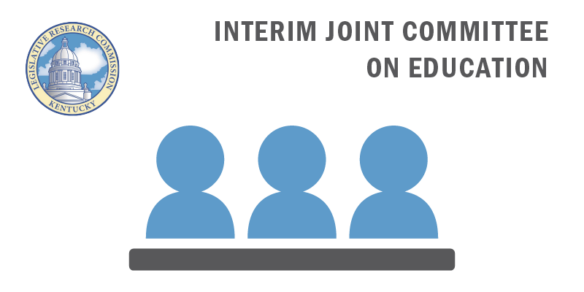
Commissioner of Education Robbie Fletcher detailed his priorities for the job as well as his experiences during his first months at the Kentucky Department of Education (KDE) with lawmakers at the Interim Joint Committee on Education meeting on Aug. 20.
Among his priorities, Fletcher said, he wants to build relationships with legislators and many other groups to bolster opportunities for students to learn. Fletcher broke down what he means by opportunities into three categories: the opportunity to dream, to struggle and to succeed.
“We have to teach our kids, so often, that they have tremendous potential. We want to teach them to dream. We want to give them opportunities to dream,” Fletcher said. “But also, too, we have to give them opportunities to struggle. Life is tough. We need to lift them up. We need to give them opportunities to grow, to learn, to struggle.”
He credited staff members he worked with in previous positions for allowing him to succeed, emphasizing that it takes a group effort to be successful.
“My story in public education is something I’m very proud of, I’m very thankful for,” he said. “But the people that I worked with every single day, from the cooks in the cafeteria to the bus drivers … to the teachers, gave me those opportunities to succeed, and I am so thankful for that.”
Another one of Fletcher’s top priorities is developing a new assessment and accountability system.
“We want to build a prosperous Kentucky, and we will launch an accountability system that is meaningful and useful to all of our learners,” Fletcher told lawmakers.
Fletcher discussed how the Kentucky United We Learn Council has been developing a number of assessment and accountability system prototypes that describe how Kentucky might revise its systems.
The latest prototype focuses on an accreditation-style model that includes a vibrant learning experiences indicator. Schools would submit evidence to an external evaluator and the local board of education and receive ratings on rubrics with feedback for improvement.
Fletcher said KDE is now entering the study phase of the new prototype, which will involve 36 school districts providing direct feedback to KDE staff members and Kentucky United We Learn Council members. The department also is going to seek input from all districts once the study phase starts through Kentucky’s education cooperatives.
Fletcher fielded questions from lawmakers regarding the council’s work. He stressed that while the council is looking at assessment and accountability, it is important to make sure to take the whole child into account.
“If you give kids high expectations, build a relationship and give them opportunity, they’ll go through a wall for you; they’ll go anywhere for you,” Fletcher said. “But we do have to meet those physical needs and those emotional needs to make sure that we can push them to those higher levels when it comes to math and reading. We have a long way to go … and we will do our best to achieve higher for our kids.”
Fletcher also told committee members he wants to work on potential reforms with the Support Education Excellence in Kentucky (SEEK) funding formula, aiming to strike a better balance between property-poor and property-rich districts.
Fletcher emphasized his “All In” approach when it comes to education to honor everyone who has helped him along the way in public education and to make sure students are at the forefront of everything he does.
“The ‘All In’ mantra … is more than just a hashtag to me; it’s a way of life,” Fletcher said. “It’s also the way I try to invest in the kids.”
Fletcher, who started his position as commissioner on July 1, has been visiting several school districts in his first weeks on the job. He told lawmakers about more upcoming visits and highlighted speeches he has given to educational groups and meetings he has had so far with education leaders across the Commonwealth.




Leave A Comment